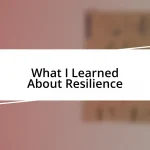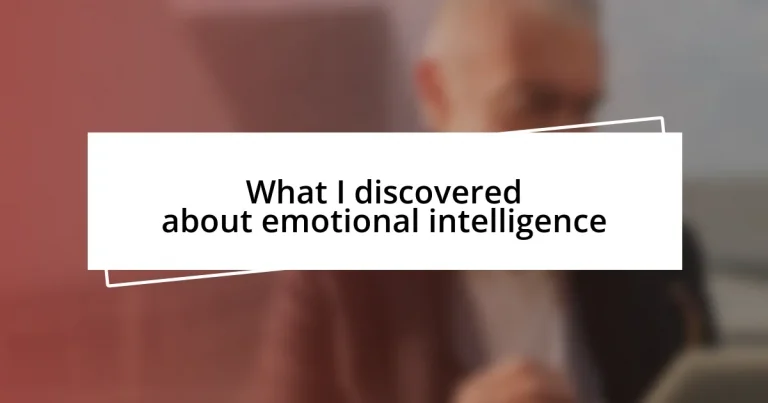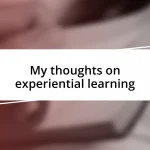Key takeaways:
- Emotional intelligence (EI) is the ability to recognize and manage emotions in ourselves and others, significantly impacting relationships and decision-making.
- Four core components of EI are self-awareness, self-management, social awareness, and relationship management, each essential for personal and professional growth.
- Practices like mindfulness, active listening, and journaling can enhance emotional intelligence, leading to improved interactions and understanding.
- In the workplace, high EI promotes productivity and loyalty, as it fosters supportive environments where open communication and vulnerability thrive.
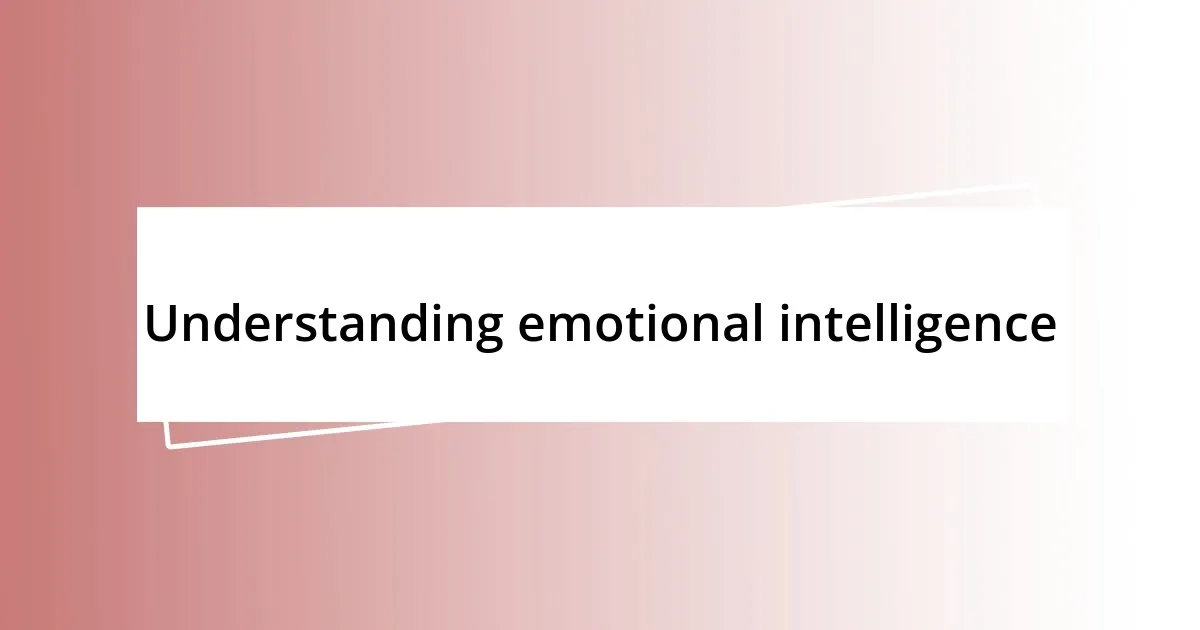
Understanding emotional intelligence
Emotional intelligence, often abbreviated as EI, is the ability to recognize, understand, and manage our emotions and the emotions of others. I remember a time in my workplace when a colleague seemed particularly down. Instead of ignoring it, I made an effort to check in, and it turned out they were facing personal challenges. That experience made me realize how essential it is to be attuned to others’ feelings, not just our own.
What’s fascinating about EI is that it can significantly impact our relationships and decision-making. Have you ever found yourself in a heated discussion, only to notice how your emotions clouded your judgment? I’ve been there. Learning to pause and examine my emotional response helped me engage more thoughtfully, transforming potential conflicts into productive conversations.
In my journey to understand emotional intelligence better, I discovered that it involves four core components: self-awareness, self-management, social awareness, and relationship management. For instance, during a stressful project, I often took a moment to assess how my feelings were affecting my team. This practice not only improved my emotional regulation but also strengthened our collaboration, fostering an environment where everyone felt valued and understood.
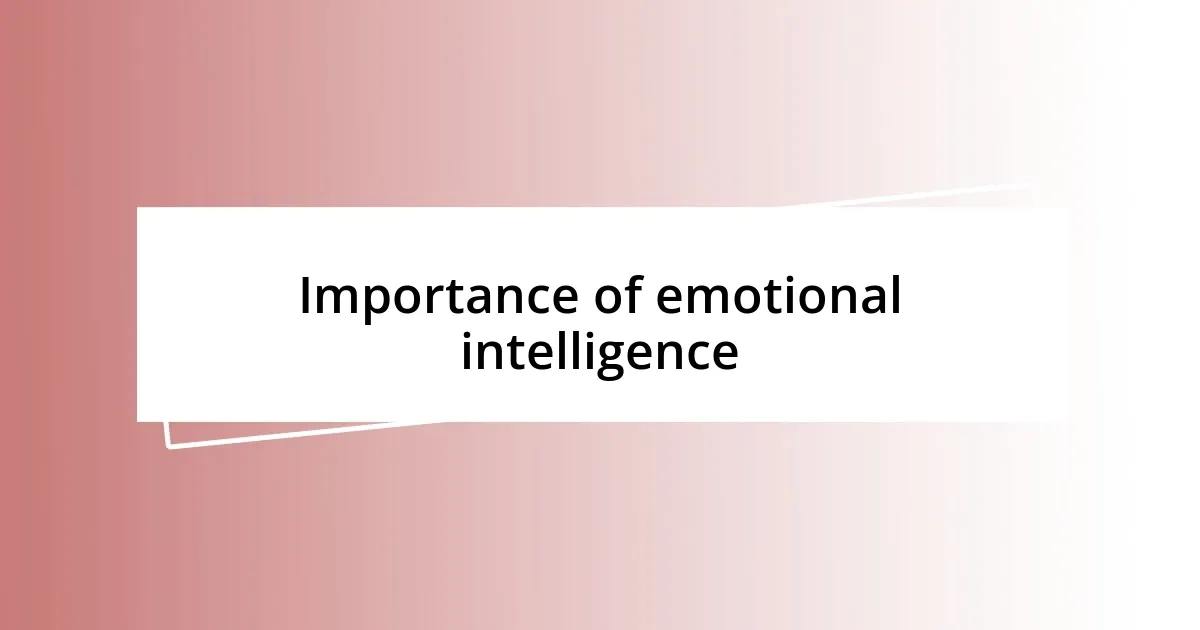
Importance of emotional intelligence
Understanding the importance of emotional intelligence has been a game changer for me in both my personal and professional life. I once worked on a team project where tension began to rise. By recognizing my own stress and addressing it openly, I not only alleviated my discomfort but also encouraged my teammates to express their concerns. This open dialogue not only improved our workflow but also deepened our trust in one another.
Emotional intelligence fosters stronger connections and smoother communication. Here are some pivotal reasons why focusing on EI is beneficial:
- Enhanced Relationships: Being attuned to emotions allows for more empathetic interactions.
- Improved Decision Making: By managing emotions, we can make clearer and more rational choices.
- Conflict Resolution: EI helps navigate disagreements positively, turning potential conflicts into opportunities for growth.
- Increased Self-Awareness: Understanding our emotions leads to better self-regulation, allowing us to respond rather than react impulsively.
Reflecting on these insights, I realize that cultivating emotional intelligence not only benefits ourselves but also enriches the environment around us.
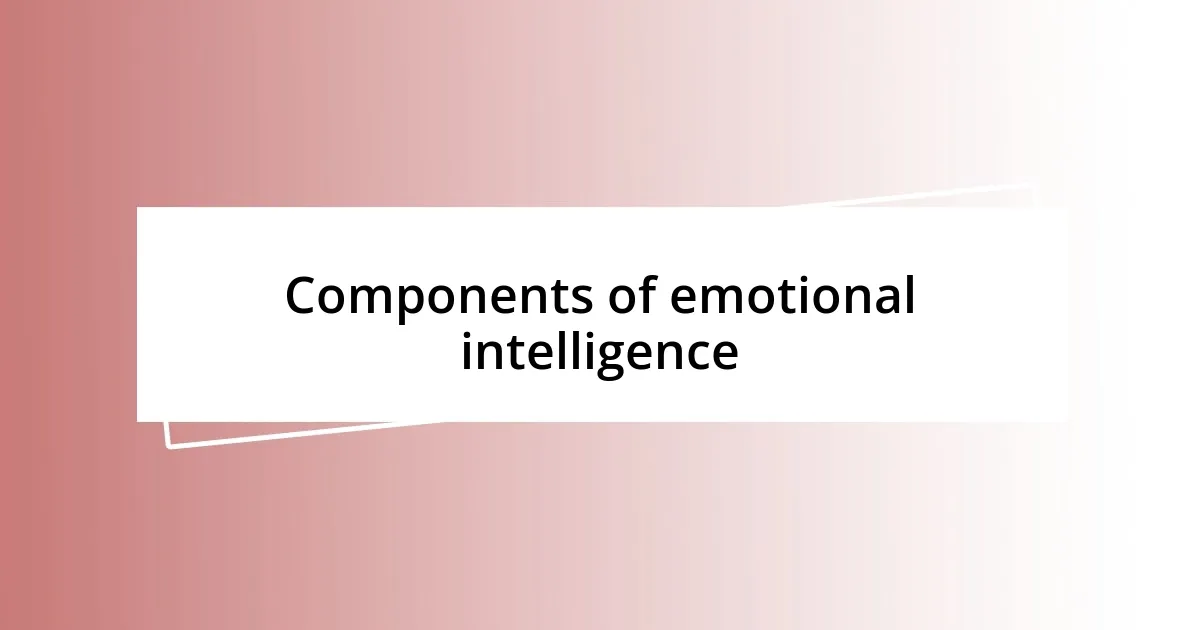
Components of emotional intelligence
The components of emotional intelligence offer a framework for understanding how we can better relate to ourselves and others. Self-awareness is the first component, and I’ve found that recognizing my own emotions is crucial. For example, during a challenging conversation with a friend, I realized I was feeling defensive. By acknowledging this feeling, I was able to approach the discussion with more openness, ultimately leading to a deeper connection.
Moving on to self-management, I recall a time when I faced an overwhelming workload. Instead of letting my stress dictate my reactions, I took short breaks to regroup. This practice helped me maintain a calm demeanor and stay productive, proving that managing my emotions can significantly enhance my performance.
Social awareness and relationship management are equally valuable. In a leadership role, I noticed how being aware of my team’s emotional state allowed me to support them effectively. By actively listening and validating their feelings, I fostered a culture of trust that encouraged collaboration and resilience.
| Component | Description |
|---|---|
| Self-Awareness | Understanding one’s own emotions and their effects on thoughts and behavior. |
| Self-Management | Regulating emotions, controlling impulses, and adapting to changing circumstances. |
| Social Awareness | Recognizing and understanding the emotions of others. |
| Relationship Management | Building and maintaining healthy relationships through effective communication and conflict resolution. |
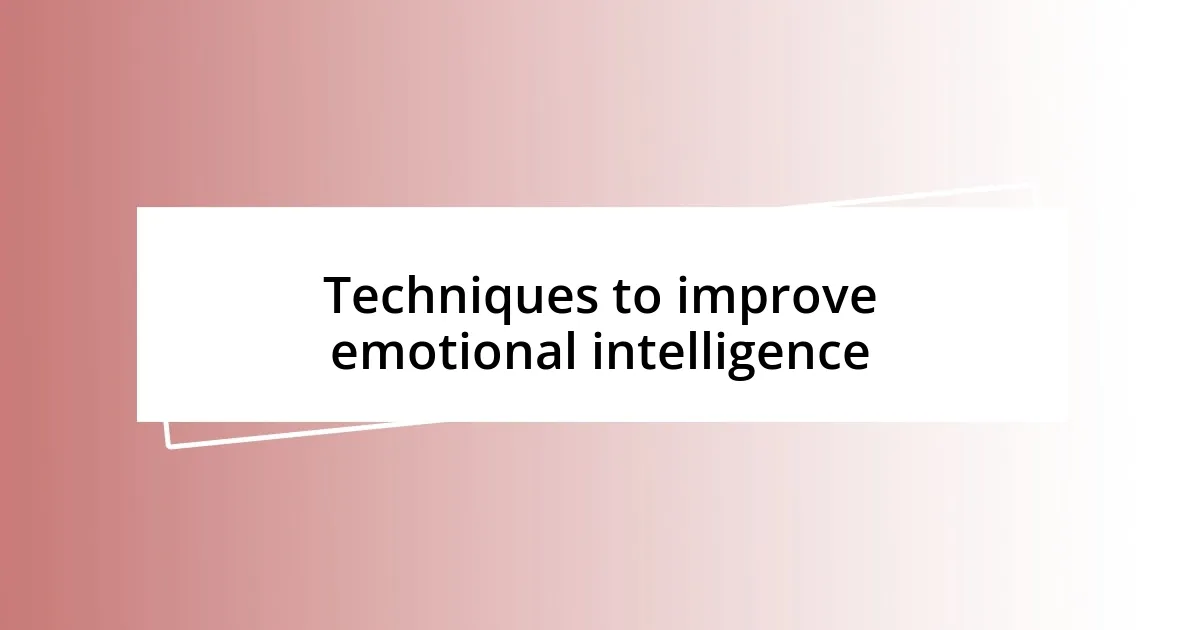
Techniques to improve emotional intelligence
Improving emotional intelligence is a journey that requires active practice. One technique I’ve found particularly valuable is mindfulness. By setting aside just a few minutes each day to focus on my breathing and observe my emotions without judgment, I create space for reflection. It’s astonishing how this simple act can uncover feelings I didn’t even realize I was suppressing.
Another approach is engaging in active listening. Whenever I find myself in conversations, I make a conscious effort to listen more than I speak. I’ve noticed that when I focus on the speaker’s words and emotions, I not only show empathy but also gain deeper insights into their perspective. Have you ever felt more connected after truly hearing someone out? It’s a powerful experience that transforms interactions.
Lastly, journaling can be a fantastic tool for self-reflection. I remember keeping a journal during a particularly stressful time. By writing down my thoughts and what triggered my emotional responses, I learned to identify patterns in my behavior. This practice not only enhanced my self-awareness but also provided clarity on how I could respond better in similar situations in the future. How about you? Have you tried reflecting on your emotions through writing? It might just provide the breakthroughs you’re looking for.
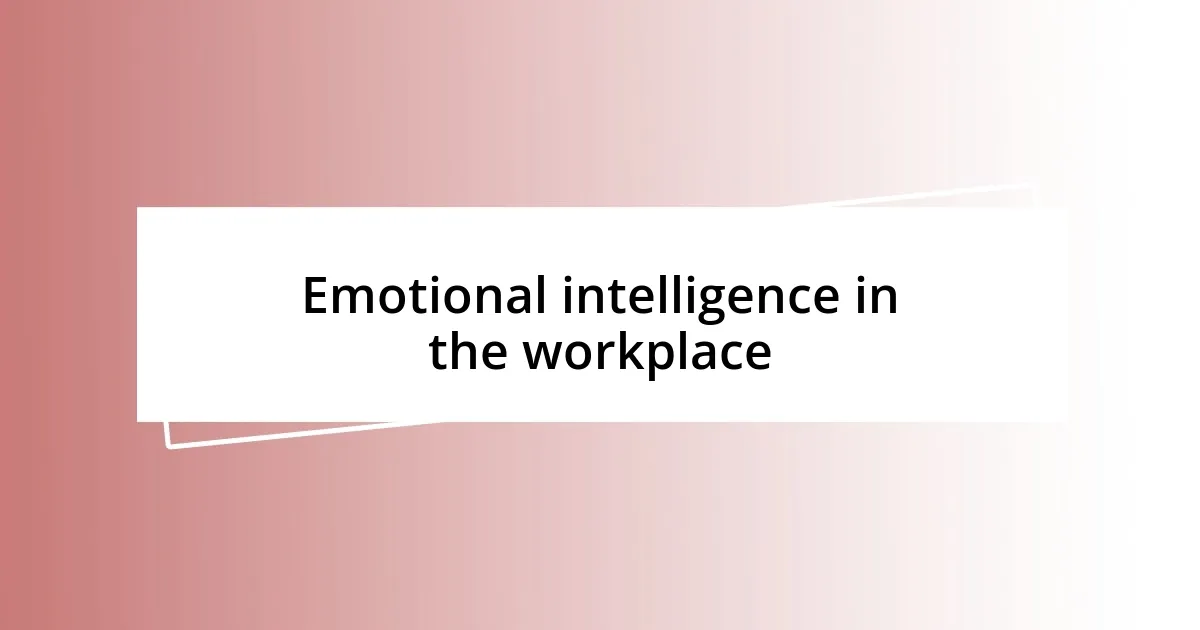
Emotional intelligence in the workplace
I’ve discovered that emotional intelligence in the workplace is a game changer for both individuals and teams. For instance, I once worked with a colleague who excelled at reading the room during meetings. This person could sense when tensions were running high and would shift the conversation to lighter topics, creating a more relaxed atmosphere. Seeing how that simple act diffused potential conflict made me realize the impact of being socially aware.
Moreover, I’ve learned that emotional intelligence can directly influence productivity. There was a project where my team faced tight deadlines and stress was palpable. Instead of pushing through without addressing our feelings, we opened up about our pressures. That honest discussion not only relieved stress but also sparked renewed motivation. Have you ever found that sharing your struggles with colleagues made the workload feel lighter? It’s a reminder that vulnerability can lead to stronger connections and enhanced collaboration.
In my experience, leaders with high emotional intelligence inspire greater loyalty from their teams. I vividly recall a manager who took the time to check in with us regularly, not just about work but about how we were genuinely doing. This investment in our well-being made us feel valued and motivated us to go the extra mile. Isn’t it fascinating how creating a supportive environment can yield such positive outcomes? It reinforces the idea that emotional intelligence isn’t just a skill; it’s a vital component of effective leadership and team dynamics.
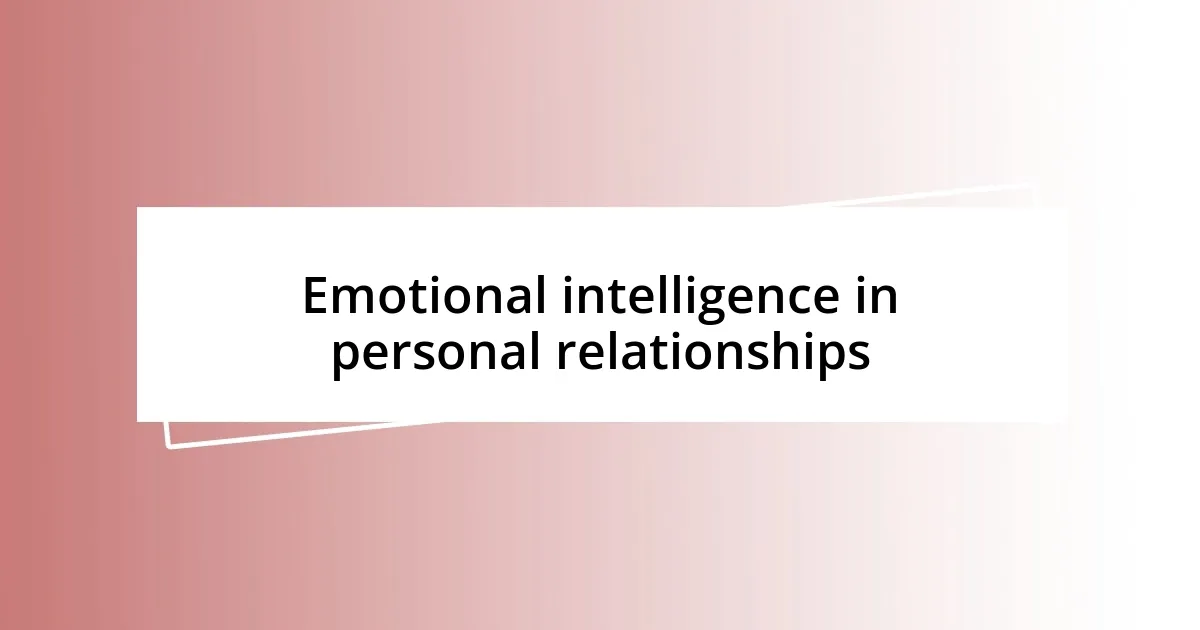
Emotional intelligence in personal relationships
In my experience, emotional intelligence plays a crucial role in my personal relationships. For instance, there was a time when my partner and I hit a rough patch. I found that, through empathetic communication and recognizing each other’s emotions, we could navigate our disagreements more effectively. Isn’t it interesting how understanding the feelings behind someone’s words can transform conflict into collaboration?
I’ve often reflected on the power of vulnerability within my friendships. I remember a moment when a close friend opened up about their struggles, and instead of brushing it aside, I took a moment to validate their feelings. This acknowledgment deepened our connection and fostered a safe space for both of us to share openly. Isn’t it remarkable how being emotionally available can bring people closer together?
One emotional insight I’ve gathered is the importance of recognizing nonverbal cues in relationships. The other day, I caught myself realizing how often I would dismiss my partner’s unspoken feelings. By simply paying attention to their facial expressions and body language, I could address underlying issues before they escalated. Have you ever noticed how much we can understand without words? It can truly enhance our emotional connection.
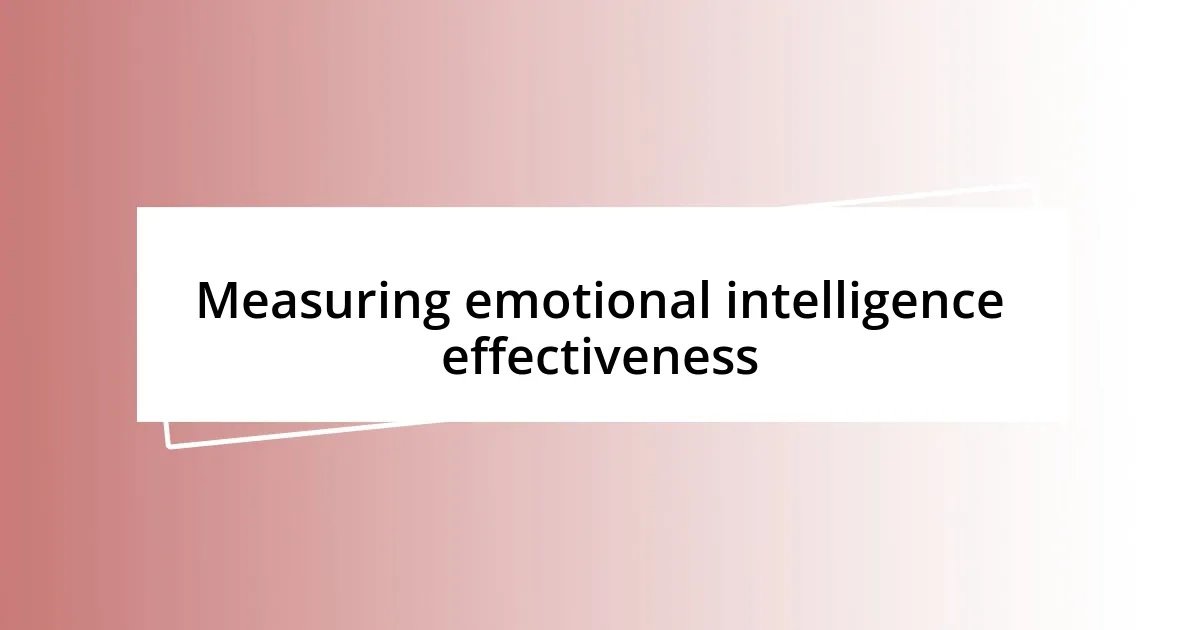
Measuring emotional intelligence effectiveness
Measuring the effectiveness of emotional intelligence often comes down to observing tangible outcomes in both interactions and performance. I recall a time when a coworker implemented regular emotional check-ins during our team meetings. These moments not only provided us with a space to express ourselves but also led to a noticeable increase in project efficiency. Have you ever tracked your productivity after a satisfying team discussion? It’s intriguing how emotional awareness can translate into measurable results.
Additionally, I’ve found that feedback plays a crucial role in assessing emotional intelligence. After participating in a workshop on emotional skills, I sought feedback from peers about my own emotional responses in challenging situations. Their insights were enlightening and highlighted areas I hadn’t even considered. How often do we take the time to ask others about our emotional impact on them? This simple act of seeking feedback can significantly enhance our emotional intelligence journey.
Moreover, tools like emotional intelligence assessments can offer structured insights into one’s abilities. I once underwent a self-assessment that dissected my emotional strengths and weaknesses. The results prompted me to focus on improving my empathy skills, which had a ripple effect in both my personal and professional life. Have you ever tried an assessment to gauge your emotional skills? It’s a powerful step toward personal growth.
